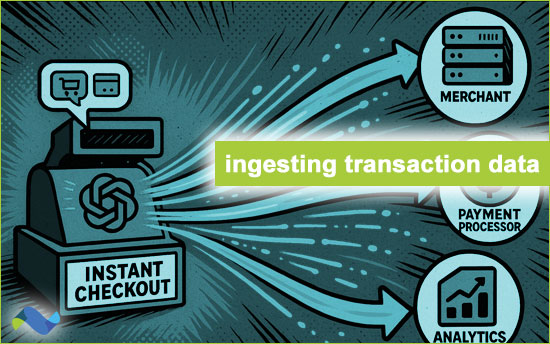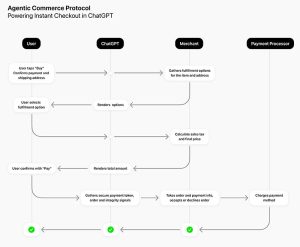LLMS & CHATBOTS
Let the transaction data be ingested
Positioning ecommerce capabilities as part of its “agentic commerce” strategy, OpenAI announced Instant Checkout yesterday, a new feature that allows users to buy products through its answer engine, ChatGPT. It also starts creating an impressive pool of transaction data that OpenAI’s LLM can learn from.
The pitch to merchants: “Turn chats into checkouts.”
Read: “Buy it in ChatGPT: Instant Checkout and the Agentic Commerce Protocol” – OpenAI (September 29)
CNBC summarized the news:
“Instant Checkout initially supports single-item purchases directly from U.S. Etsy sellers, and it’s available to U.S. ChatGPT Plus, Pro and Free users. OpenAI said more than one million Shopify merchants, including Skims and Glossier, are coming soon. (…) OpenAI will take a fee from transactions that are completed through ChatGPT, which means Instant Checkout could become an important new revenue stream for the startup.”
Read more on CNBC. (September 29)
OpenAI also announced the Agentic Commerce Protocol, which it described as providing “the language that lets AI agents and businesses work together to complete a purchase for a user.” Stripe is the key partner on the new protocol.
Here is the info for developers on the Agentic Commerce Protocol.
Related: Mobile Dev Memo analyst Eric Seufert provided a ‘hot take’ about Instant Checkout late yesterday on LinkedIn:
- “OpenAI’s integration with Stripe isn’t ‘agentic commerce’: it’s in-product checkout, similar to the native checkout experience that Meta recently eliminated because it was unpopular with users and didn’t improve Meta’s ability to collect conversion data…”
From tipsheet: Can we retarget visitors to the shopping cart, yet? How about the product page? The company was silent on the ads question as it attempts to navigate what it sees as the significant challenge of presenting ads while maintaining trust in the answer engine product.
In addition to saying that its new Instant Checkout puts the user first and was secure, the company said, “Data sharing is minimal — only the information required to complete the order is shared with the merchant, with the user’s permission.” But the data shared with OpenAI’s LLM is… limitless! Ingest NOW!
Commerce before ads. It is written.
With the inclusion of Shopify and Etsy merchants, it would not be surprising to see any new ad product —similar to a Google Ads (née Adwords)— start with SMBs. Enabling ”the little guys or gals”, first, might speak to OpenAI’s goal of maintaining trust between ChatGPT and its enormous but still-expanding user base.
LLMs & CHATBOTS
Developments
- Introducing Claude Sonnet 4.5 (September 29) – Anthropic
- Introducing parental controls (September 29) – OpenAI
- The People Running Elon Musk’s xAI (September 29) – The Information
BRANDS
Use case: Theater marketing
On Broadway World, theater marketer Yuliia Bohatyr at agency SpotCo writes a piece titled, “When AI Replaces Targeting: What Meta’s 2026 Update Means for Theater Marketing.”
The article shows use cases, but it’s also a critical review of Meta’s AI ad platform Advantage+:
“Particularly frustrating is the loss of segmentation by Broadway star fan bases. For years, targeting fans of such big names as Jonathan Groff, Lea Michele, or Idina Menzel has been one of the most effective ways to spark awareness for a production. But as of January 15, even those categories will disappear.(…)
…Meta is sending a clear signal that Advantage+ is the future. But already, the most granular option left within Broadway is simply ‘Broadway theater.’ This means there is no way to segment between shows as different as The Great Gatsby and Little Shop of Horrors. For live productions, where audience fit is everything, this loss of precision is a major blow…”
From tipsheet: I realize the number of theater marketers reading tipsheet may be limited, but the granularity of detail in this piece is impressive and, appropriately, entertaining. Overall, the gradual loss of targeting control for theater marketers speaks to Meta CEO Mark Zuckerberg’s goal of taking the targeting out of the marketers hands with AI automation by the end of 2026.
AGENCIES
Horizon and Havas’ AI native venture
Independent agency Horizon Media and ad holding company Havas announced the launch of a new joint venture called Horizon Global.
At the center of the venture is the “AI native” BluConverged platform, an amalgam of Horizon’s AI-enabled marketing platform Blu and Havas’ Converged[dot]AI platform.
A LinkedIn post from Horizon Media read in part: “This is not the next step in a holding company model, it is a strategic reset.”
An excerpted press release on the Havas website explained:
Horizon Global will focus on US-centric global client opportunities. Outside of those opportunities, Horizon Media and Havas Media Network will continue to operate independently servicing their respective client portfolios, pursuing new business and building their brand profiles.
Regarding Horizon Global’s org chart, another release said Horizon’s President Bob Lord would initially guide the agency as “interim CEO.”
Read the full press release. (September 29)
And, read more on Ad Age. (September 29 – subscription)
From tipsheet: In the wake of the Omnicom-IPG merger, a Havas + Horizon merger down the road would appear to make sense if the U.S. joint venture can carve out success in the near term. One possible impediment is the Horizon and Havas agency teams that are not a part of this deal, but still using the Blu or ConvergedAI platforms. How will business be prioritized?
SELL-SIDE
AI crawlers and robots.txt
Coming out of last week’s launch of an AI web crawling solution for publishers by content delivery network Cloudflare, Digiday finds out that publishers aren’t big believers in the tiny, server-side text file at the solution’s heart, robots.txt.
Jessica Davies and Sara Guaglione tackled the tiny but important topic on Digiday yesterday:
“Cloudflare’s new Content Signals Policy effectively upgrades the decades-old honor system and adds a way for publishers to spell out how they do (and perhaps more importantly – how they don’t – want AI crawlers to use their content once it’s scraped.)…”
The problem is enforceability, say publishers. Will the AI crawlers, especially Google, listen?
At stake is essential search referral traffic for pubs: Google Search uses the same crawler as some of Google’s AI models.
Read more on Digiday. (September 29)
Related: How AI search responds when you make a site more crawlable (September 29) – Search Engine Land
SELL-SIDE
Copyright opt-out & OpenAI video
The Wall Street Journal reported yesterday that OpenAI executives have been informing movie studio owners and others about a coming update to its Sora video generator that will use copyrighted images and video unless the copyright owner informs OpenAI. This is similar to the current rights structure for its image generation tool.
The WSJ explained:
“OpenAI began alerting talent agencies and studios about the forthcoming product and its opt-out process over the last week and plans to release the new version in the coming days, the people said.
The opt-out process for the new version of Sora means that movie studios and other intellectual property owners would have to explicitly ask OpenAI not to include their copyrighted material in videos the tool creates.
While copyrighted characters will require an opt-out, the new product won’t generate images of recognizable public figures without their permission, people familiar with OpenAI’s thinking said.”
Read more in The Wall Street Journal. (September 29 – subscription)
From tipsheet: Rights management around AI will be creating jobs.
Separately, it will be fascinating to see an AI-enabled video ads tool when it comes from OpenAI given the evolution of Sora.
TECH
Aiming AI at third-party data
In an effort to boost its open web advertising capabilities, The Trade Desk announced plans to launch Audience Unlimited, a third-party data solution for marketers.
Part of Audience Unlimited’s benefit to marketers will be the ability to see how third-party data will potentially work with an AI scan to “score data segments” before any cost is incurred, according to The Trade Desk.
The company also announced introduction of new “Koa Adaptive Trading Modes” which allow marketers the option to choose between a campaign management “co-pilot” role along with an AI co-pilot. Or marketers can use “control mode” and have more manual control. Both come with agentic AI “recommendations and opportunities.”
More: “The Trade Desk Announces Major Overhaul of Digital Advertising Data Marketplace.” – press release (September 29)
W Media Research analyst Karsten Weide commented on the news:
“Many buyers avoid third-party data because it’s pricey and hard to know which segments actually work. With AI-scored, bulk-priced data, those hurdles disappear — boosting campaign performance, sales, and Kokai stickiness.”
Read more from Mr. Weide on LinkedIn. (September 29)
The Trade Desk said Audience Unlimited and Koa Adaptive Trading Modes “will be available for select agencies on the Kokai platform in late 2025, and to all users early 2026.”
From tipsheet: If it isn’t happening already, the next step here appears to be marketers potentially letting The Trade Desk handle the full campaign from AI scan of the entire third-party data set to execution. Let ‘er rip.
TECH
TikTok AI for travel ads
Social video giant TikTok announced a version of its Smart+ ad system customized for travel industry marketers – TikTok Travel Ads. Smart+ was originally launched as a performance marketing automation platform last October.
Reporter Mark Mwachiro parsed yesterday’s TikTok travel news for Adweek:
“TikTok Travel Ads feature optimization models that identify high-intent audiences and match them with travel offerings based on their in-market activities and preferences. Advertisers can also combine TikTok’s travel intent model with their catalog data to deliver relevant, personalized travel ads at scale across the entire journey, and then use Smart+ AI tools to automate parts of their campaign, including setup, creative generation, and delivery optimization.”
- Read more in Adweek. (September 29)
- See TikTok use cases from Accor, Melia and Etihad.
- And more coverage on the new travel ad product from travel industry site PhocusWire. (September 29)
More background: In June of this year, TikTok’s Smart+ platform touted its “AI” capabilities as well as tools such as Ad Assistant,” an AI chatbot help solution for marketers – particularly SMBs.
GMV Max is TikTok’s AI-enabled shopper marketing platform tied to TikTok Shop which has experienced cutbacks.
From tipsheet: What’s interesting to note about the travel product is the powerful transaction data which appears to be feeding the TikTok AI-enabled ad system. From “discovery to booking,” explained TikTok’s head of US verticals, David Hoctor.
PROMPT
Explain how formats for online video advertising and CTV will change by 2030.
Response from Google’s Gemini:
“The formats for online video advertising and Connected TV (CTV) are expected to undergo significant transformation by 2030, driven primarily by advancements in technology, changes in consumer viewing habits, and the need for more measurable and engaging ad experiences. Here is an explanation of the key changes expected in formats for online video advertising and CTV…”
MORE
- Opinion: Why genAI search is as bad for shoppers as it is for marketers (September 29) – MarTech
- Google’s AI Max for Search: What 30 days of testing reveal (September 29) – Search Engine Land
- Podcast: Marketing In The Age Of AI Answers (September 24) – AdExchanger
- The 2025 State of AI for Hotels and Airlines report (September 29) – Amperity on PhocusWire (PII required)


